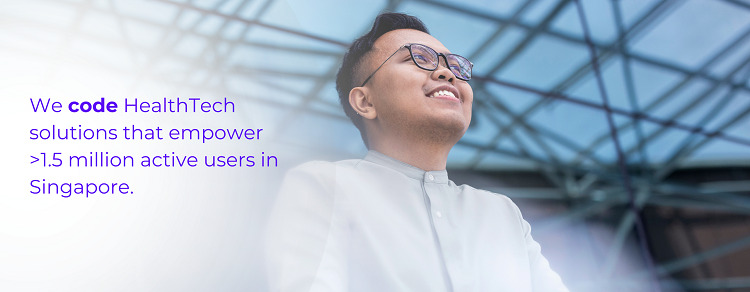
At Synapxe, Singapore’s national HealthTech agency, our IT and tech professionals are pressing on to keep up with the rapid changes in the field of information technology (IT) and tech to build intelligent, integrated and interoperable tech solutions that accelerate innovation and deliver better health outcomes for citizens. When the COVID-19 pandemic took the world by storm, the healthcare sector expanded rapidly, causing an unprecedented surge in demand for HealthTech professionals to tackle current and emerging challenges.
IT and tech professionals work in tandem with our public healthcare and the private sector to lay the tech foundation for a healthier nation. These professionals are responsible for introducing, developing, sustaining, and enhancing diverse hospital systems and applications such as HealthHub and the National Electronic Medical Record, innovative solutions like telehealth technologies and remote monitoring of patients at home, and more.
Read on to explore the intricacies of IT and tech job roles and responsibilities.
1. Data Analyst

Roles and responsibilities:
Thoughtful and strategic decisions are often rooted in reliable data, and this is where the expertise of a data analyst becomes indispensable. To meet real-world business needs, a data analyst must first define and digest challenges effectively and translate these needs into analytics.
Technical skills come into play as data analysts collect data from internal systems and external sources meticulously. They delve into dataset analysis by performing statistical, algorithmic, mining, and visualisation techniques while ensuring that the data is assessed for quality and prepared for advanced analysis. A data analyst would hence require a broad knowledge of statistical and data mining techniques and be proficient in software like R, Python and Jupyter Notebook. Experience with data visualisation tools like Tableau would be an added advantage.
Career paths:
An associate data analyst will advance to a data analyst and further their career as a senior data analyst. A senior data analyst sets the strategy and approach for improving the data quality for projects – as well as works with various stakeholders, recommends new processes to be put in place, and educates key personnel at various healthcare institutions.
2. Software Engineer

Roles and responsibilities:
Software engineers play a pivotal role in developing, implementing, and optimising applications. They collaborate closely with systems analysts and contribute extensively to the development of innovative healthcare application platforms and solutions in a full Software Development Life Cycle (SDLC). They actively conduct peer code reviews and refine user requirements, ultimately enhancing system performance for the transformation of Singapore’s HealthTech landscape.
Software engineers need to be equipped with strong knowledge of coding practices and technical knowledge such as C#, ASP.NET, JavaScript, and MS-SQL and more. Experience with Scrum and Agile development methodologies is recommended.
Career paths:
Junior software engineers will progress to lead engineer roles, specialising in specific HealthTech applications and systems.
3. Systems Analyst

Roles and responsibilities:
Systems analysts are involved in conducting requirements analysis, system implementation, and providing ongoing application support. They will need to build strong rapport with business users, identify their needs and convert these into system specifications. Having knowledge of hospital processes and workflows will be greatly beneficial to the work of a systems analyst in healthcare.
A systems analyst will work closely with different stakeholders, functioning as the bridge between users and technical staff throughout the solution implementation cycle and collaborating with developers and vendors to ensure requirements are incorporated into system design.
Additionally, they will conduct in-depth analysis of the business requirements specifications and feasibility studies on possible solutions to implement. Planning and coordinating end-user training for any system implementations or enhancements is part of the change management facilitation process. A systems analyst will also be tasked with providing round-the-clock application maintenance support when necessary and should be readily equipped with the skills to conduct proper project documentation to monitor and track progress status.
Career paths:
Junior system analysts will progress to senior system analysts, specialising in specific HealthTech applications and systems.


